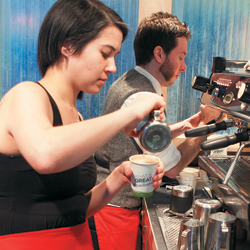photos: Atmel Corp.
*2014 DATA IS BASED ON STATISTICS GATHERED FROM EVENTS HELD BETWEEN JANUARY AND NOVEMBER
| ALL STAR |
 Donna Castillo, senior global event manager for Atmel Corp., has worldwide experience within tech-oriented environments. She has created and optimized user engagement to build preference and increase sales with existing and new customers via large multiday conferences, trade shows, C-level events, and corporate marketing and branding campaigns. She gets excited about new challenges and opportunities, and is truly passionate about marketing. Donna Castillo, senior global event manager for Atmel Corp., has worldwide experience within tech-oriented environments. She has created and optimized user engagement to build preference and increase sales with existing and new customers via large multiday conferences, trade shows, C-level events, and corporate marketing and branding campaigns. She gets excited about new challenges and opportunities, and is truly passionate about marketing.
|

o generously paraphrase Chinese philosopher Laotze, "The journey of a thousand face-to-face engagements begins with a single stop on a mobile tour." Although you likely won't find that version embossed on the cover of someone's leather dream journal, it did become a marketing mantra of sorts for Donna Castillo, senior global event manager for Atmel Corp. As manager of Atmel's event-marketing program, Castillo oversees a tactical trifecta that comprises three components: large public and private events, offsite educational seminars, and online training webinars. The primary objectives for all modalities are brand awareness and face-to-face engagement achieved by way of technology education, which seems like a rather altruistic venture for a company that makes semiconductors (the building blocks for electronics). Naturally, Atmel's secondary objective is lead collection, as it uses the training events to drive sales among a stubborn and cynical target audience: computer-design engineers. "They tend to resist anything new or different, unless it's packaged as educational," Castillo says. "So all of our marketing events focus on training first."
Thus, each year leading up to 2014, Castillo and her team planned and executed hundreds of events, including hands-on training sessions in hotel conference rooms and public webinars hosted by Atmel's technical staff. The subject matter covered all things computer science, and though Atmel hung a branded banner or two, the events were a strictly soft-sell scenario and thus, well attended across the board – so much so that upper management took notice. "The overall programs were successful in terms of delivering results and staying on budget," Castillo says. "But in late 2013, we set a goal to increase face-to-face engagement." The catch, of course, was that Castillo's budget would remain stagnant.
"I had to rethink our approach to event marketing," Castillo says. "We had plenty of traction with our programs, but they weren't scalable, and our strategy was linear – we employed a limited amount of 'contact moments' throughout the year as opposed to establishing an 'always on' approach." In fact, through competitive research, Castillo learned the linear approach was status quo in the semiconductor market. Companies such as Advanced Micro Devices Inc. (AMD), Qualcomm Inc., and Texas Instruments Inc. reached out to the tech-minded masses via various channels, but those channels didn't necessarily integrate with one another, and they weren't exactly personal. So a prospect might attend a webinar, but not realize the company also offered live events. "No one had an entirely integrated approach that touched the audience offline and online," she says. Fortunately for Castillo, Atmel had all the pieces.
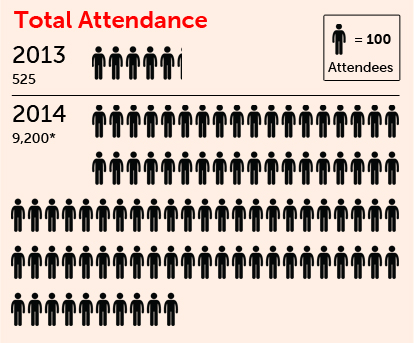 For weeks Castillo pored over the current program looking for areas in which engagement could be increased without additional costs, and met with internal stakeholders to get their take on the situation. "I reviewed our audience demographics, geographic coverage, engagements, and branding efforts, and found that we were missing key opportunities in our marketing plan," she says. For example, Atmel's event-marketing strategy didn't include much social-media activity, and none of the events that Castillo and her team executed each year, reached out to universities – a sizeable missed opportunity to raise brand awareness among future computer-design engineers and potential Atmel customers. Furthermore, by plotting the number of hits to Atmel.com by region against the firm's face-to-face engagements in those regions, Castillo realized that a number of markets interested in Atmel were being underserved. It was time to defrag the events hard drive.
For weeks Castillo pored over the current program looking for areas in which engagement could be increased without additional costs, and met with internal stakeholders to get their take on the situation. "I reviewed our audience demographics, geographic coverage, engagements, and branding efforts, and found that we were missing key opportunities in our marketing plan," she says. For example, Atmel's event-marketing strategy didn't include much social-media activity, and none of the events that Castillo and her team executed each year, reached out to universities – a sizeable missed opportunity to raise brand awareness among future computer-design engineers and potential Atmel customers. Furthermore, by plotting the number of hits to Atmel.com by region against the firm's face-to-face engagements in those regions, Castillo realized that a number of markets interested in Atmel were being underserved. It was time to defrag the events hard drive.
Stripping away conventional labels such as "business-to-business" and "business-to-consumer" from her meetings and events, Castillo adopted an approach called people-to-people marketing. "Human interactions promote trust and confidence, and people-to-people marketing produces long-term relationships that ultimately drive revenue," she says. So Castillo pinpointed all the places in her current program that facilitated face-to-face engagement, and looked for ways to open those up to a wider general audience. "While design engineers comprise our core audience, most of our educational events are open to the public for a nominal fee, and anyone can attend regardless of company, job title, or education," she says.
Why would lay people want to attend an Atmel training session? The answer is simple: Arduino. In a nutshell, Arduino comprises open-source software and hardware that inventors, tinkerers, and so-called "makers" use to create everything and anything they can dream up, from blinking LEDs to articulated alien-robot babies. Atmel makes the microcontrollers used in Arduinos and is thus plugged in to that creative community, which hosts hundreds of events across the globe dubbed "Maker Faires," where makers show off their latest inventions. Atmel is to Arduino what J.K. Rowling is to Harry Potter. In essence, everyone that has an Arduino is an Atmel prospect or current customer.
Because Arduino has such broad appeal, Castillo figured she could gain more face-to-face engagements by becoming just as open sourced as the user-friendly platform. "I wanted to humanize the brand and make it more accessible to the general public in hopes that it would increase awareness and eventually have an impact on the number of brand interactions we generated," she says.
The task of humanizing a semiconductor company might sound like a plot point in a Stanley Kubrick film, but making Atmel more personable was a no-brainer for Castillo. After all, the company was already investing in hands-on training and product demonstrations, and most of its existing marketing events relied on human interaction. She just needed exponentially more of that interaction in order to be successful.
Marketing Motherboard
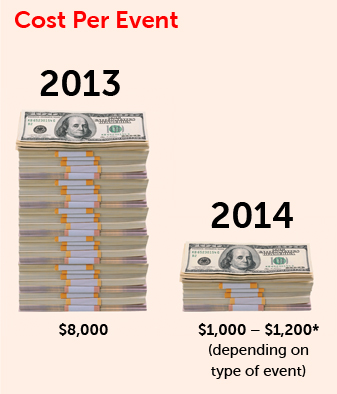
Using her research and the feedback she gathered from Atmel stakeholders, Castillo identified a handful of underperforming events (including a few trade shows) within the current marketing program and shut them down. She then shifted their budgets into her people-focused event pool. The startup money, as it were, wasn't enough to fund a face-to-face campaign on its own, so she turned her attention – and marketing machete – to the company's training seminars held at hotels. At $8,000 a pop, the spendy events (some of which were open to the public while others were for Atmel's distributors) reached an average of 35 design engineers at each stop. But with a cost per person of around $230, simply increasing the number of events in order to grow engagement was out of the question. In 2013 alone, Atmel conducted 15 such events in major (read "expensive") cities such as Chicago, Toronto, and Seattle, costing an estimated combined total of $120,000.
As expensive as it might have been, that hands-on training still provided the optimal vehicle for face-to-face engagement among Atmel's expanded audience. Castillo just had to figure out a way to increase attendance and stops without inflating costs, and that's when it hit her: Men like trucks. Non sequitur aside, Castillo knew that research showed the design-engineer audience is 98 percent male, and based on much less scientific findings, Castillo also figured that men loved trucks. So why not take the hands-on marketing approach on the open road with a pimped out tractor-trailer that replaced boring, budget-breaking hotel ballrooms?
Enlisting the help of Legacy, a San Jose, CA-headquartered transportation company that specializes in mobile exhibits, Castillo and her team crafted a road show vehicle tailor-made for face-to-face engagement. Carrying a price tag of roughly $185,000, the 40-by-85-foot trailer boasted 900 square feet of interior space thanks in part to two bump outs. Able to house 35 attendees at a time in a classroom setup, the vehicle was appointed with enough comforts and Internet connectivity to keep people content for the eight-hour training sessions that would take place inside. In fact, the trailer was outfitted in a way that allowed it to seamlessly transition from mobile conference room to content-creation platform to technical-support center to product-demo station to "hackathon" site and everything in between, generating audiences that would range from 35 to 200 students, engineers, teachers, inventors, etc. Wrapped in couldn't-miss Atmel-blue graphics, the massive tractor-trailer also doubled as a moving billboard sure to raise brand awareness even between event stops.
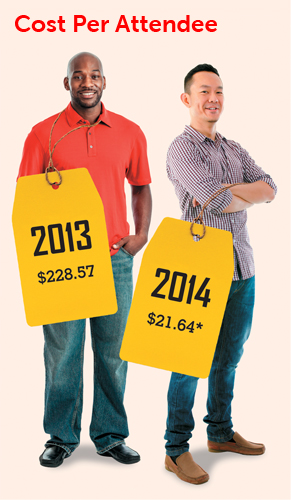 Confident that the Atmel-branded trailer could roll up to virtually any parking lot and spring into action, Castillo began mapping out the route for what she called the Atmel Tech on Tour Mobile Trailer Program. Using input from Atmel sales representatives and her own research, Castillo and her team identified more than 100 stops for the tour throughout 2014 that included industry trade shows, universities, and private events for targeted customers and prospects across North America. With the road map in hand, Castillo needed a way to spread the word about Tech on Tour to ensure a full house at each stop. So she tackled Atmel's social-media presence, which at that moment had all the buzz-building pizzazz of dial-up Internet.
Confident that the Atmel-branded trailer could roll up to virtually any parking lot and spring into action, Castillo began mapping out the route for what she called the Atmel Tech on Tour Mobile Trailer Program. Using input from Atmel sales representatives and her own research, Castillo and her team identified more than 100 stops for the tour throughout 2014 that included industry trade shows, universities, and private events for targeted customers and prospects across North America. With the road map in hand, Castillo needed a way to spread the word about Tech on Tour to ensure a full house at each stop. So she tackled Atmel's social-media presence, which at that moment had all the buzz-building pizzazz of dial-up Internet.
Social Responsibility
While Atmel had accounts on Twitter and Facebook, it wasn't necessarily using them for engagement, and the social-media platforms certainly weren't helping the company drive attendance at its events.
Castillo's people-to-people marketing strategy meant that would change. Upcoming stops would be promoted via a Tech on Tour microsite (http://training.atmel.com/TechonTour_NorthAmerica) and blog, as well as Facebook posts and tweets using the #TechonTour hashtag. Every post included a link to a registration page and information about that specific event. For example, a Tech on Tour stop in Orlando, FL, might feature demonstrations of the company's microcontrollers, while a stop in San Francisco might comprise a panel discussion about the increasingly popular Internet of Things movement.
In addition to social-media posts and blogs, Castillo crafted an email-nurturing program that targeted key decision makers and prospects in Atmel's customer database, based on the location of the upcoming stop. So when the Tech on Tour trailer was headed for Philadelphia, clients and prospects in the area received an email inviting them to attend. Atmel sent a series of three eblasts in the weeks leading up to each stop that invited recipients to visit the microsite, register for the event, and forward the email to others that might be interested in attending. To further promote the events, salespeople also personally invited clients and prospects to each stop, which could take place anywhere from a university to a Dave & Buster's parking lot. That's because Castillo had worked out a partnership with the restaurant chain, and during session breaks, Tech on Tour attendees were invited to grab some food and play a game or two at the popular restaurants.
But the social outreach didn't stop the day the trailer rolled into town. Atmel encouraged people to take selfies in front of and inside the trailer and post them to Twitter and Facebook using the #TechonTour hashtag. To bolster participation – and in turn, Atmel's social-media impressions – Castillo and her team devised a selfie contest in the form of a random drawing for a tablet. "People in this industry tend to be shy and a little unwilling to engage, but taking selfies and photos helps them get over that fear," Castillo says.
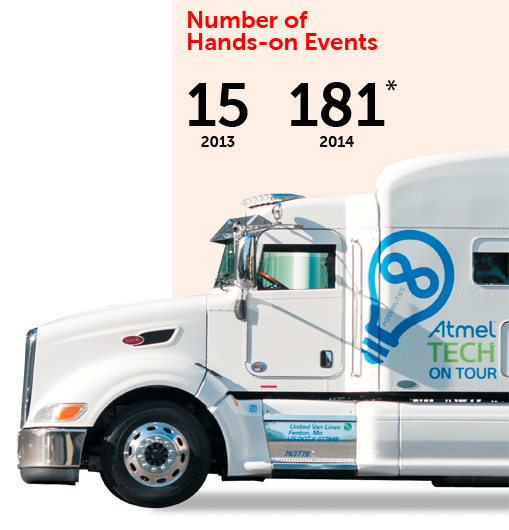 Indeed, attendees' photos quickly became a prime promotional tool for the campaign because as the #TechonTour hashtag grew in popularity after each tour stop, people started posting photos of the trailer itself when they spotted it on the road, in a parking lot, in front of a landmark, at a gas station, etc. What's more, each photo was paired with "can't wait!" captions and positive messages about the company. And the mobile tour wasn't just getting love from visitors – industry partners took notice, too, and Castillo was able to secure sponsorships for more than 20 stops, helping offset the costs of running the big rig.
Indeed, attendees' photos quickly became a prime promotional tool for the campaign because as the #TechonTour hashtag grew in popularity after each tour stop, people started posting photos of the trailer itself when they spotted it on the road, in a parking lot, in front of a landmark, at a gas station, etc. What's more, each photo was paired with "can't wait!" captions and positive messages about the company. And the mobile tour wasn't just getting love from visitors – industry partners took notice, too, and Castillo was able to secure sponsorships for more than 20 stops, helping offset the costs of running the big rig.
Crunching the Numbers
As the 2014 Tech on Tour Mobile Trailer Program slowed its roll, Castillo's people-to-people approach wasn't just practical; it was profitable to boot. By November, the tour had covered more than 75,000 miles on the open road, and made more than 180 stops that included 34 public hands-on training events, 54 demo days (including various trade shows and the Maker Faire at the White House), and 93 private events. Depending on the type of event, each stop cost Atmel a mere $1,000 to $1,200, which covered gas, the trailer lease and driver, parking fees, food and beverage, handouts, and giveaways. The events attracted anywhere from 30 to 200 people for a total reach of more than 9,200 attendees and price per person of roughly $21.64 – that's a 90.5-percent decrease in costs compared to Atmel's 2013 marketing approach, and All-Star Awards judges took notice. "It took guts to pull this off, especially with a flat budget," one judge said. "Her face-to-face program could have ended up as road kill. Instead, she is king, or rather queen, of the road."
The retooling of Atmel's social media paid off, too. During the week of Sept. 1, #TechonTour had a Twitter reach of 20,800 for a total of 82,200 impressions, and the Tech on Tour photo album on the company's Facebook page received 285 "likes." And given the tour's success, Castillo and her team posted videos about the trailer on Atmel's YouTube channel, which has close to 6,000 subscribers.
What's more, Atmel's management loved the new mobile program and approved it going forward through 2016. By identifying areas for improvement, thinking outside the hotel-ballroom box, and convincing stakeholders to take a chance, Castillo set the wheels in motion for a complete marketing overhaul that continues to pay off. Now that's a journey worth taking.





 Donna Castillo,
Donna Castillo, o generously paraphrase Chinese philosopher Laotze, "The journey of a thousand face-to-face engagements begins with a single stop on a mobile tour." Although you likely won't find that version embossed on the cover of someone's leather dream journal, it did become a marketing mantra of sorts for Donna Castillo, senior global event manager for Atmel Corp. As manager of Atmel's event-marketing program, Castillo oversees a tactical trifecta that comprises three components: large public and private events, offsite educational seminars, and online training webinars. The primary objectives for all modalities are brand awareness and face-to-face engagement achieved by way of technology education, which seems like a rather altruistic venture for a company that makes semiconductors (the building blocks for electronics). Naturally, Atmel's secondary objective is lead collection, as it uses the training events to drive sales among a stubborn and cynical target audience: computer-design engineers. "They tend to resist anything new or different, unless it's packaged as educational," Castillo says. "So all of our marketing events focus on training first."
o generously paraphrase Chinese philosopher Laotze, "The journey of a thousand face-to-face engagements begins with a single stop on a mobile tour." Although you likely won't find that version embossed on the cover of someone's leather dream journal, it did become a marketing mantra of sorts for Donna Castillo, senior global event manager for Atmel Corp. As manager of Atmel's event-marketing program, Castillo oversees a tactical trifecta that comprises three components: large public and private events, offsite educational seminars, and online training webinars. The primary objectives for all modalities are brand awareness and face-to-face engagement achieved by way of technology education, which seems like a rather altruistic venture for a company that makes semiconductors (the building blocks for electronics). Naturally, Atmel's secondary objective is lead collection, as it uses the training events to drive sales among a stubborn and cynical target audience: computer-design engineers. "They tend to resist anything new or different, unless it's packaged as educational," Castillo says. "So all of our marketing events focus on training first." For weeks Castillo pored over the current program looking for areas in which engagement could be increased without additional costs, and met with internal stakeholders to get their take on the situation. "I reviewed our audience demographics, geographic coverage, engagements, and branding efforts, and found that we were missing key opportunities in our marketing plan," she says. For example, Atmel's event-marketing strategy didn't include much social-media activity, and none of the events that Castillo and her team executed each year, reached out to universities – a sizeable missed opportunity to raise brand awareness among future computer-design engineers and potential Atmel customers. Furthermore, by plotting the number of hits to Atmel.com by region against the firm's face-to-face engagements in those regions, Castillo realized that a number of markets interested in Atmel were being underserved. It was time to defrag the events hard drive.
For weeks Castillo pored over the current program looking for areas in which engagement could be increased without additional costs, and met with internal stakeholders to get their take on the situation. "I reviewed our audience demographics, geographic coverage, engagements, and branding efforts, and found that we were missing key opportunities in our marketing plan," she says. For example, Atmel's event-marketing strategy didn't include much social-media activity, and none of the events that Castillo and her team executed each year, reached out to universities – a sizeable missed opportunity to raise brand awareness among future computer-design engineers and potential Atmel customers. Furthermore, by plotting the number of hits to Atmel.com by region against the firm's face-to-face engagements in those regions, Castillo realized that a number of markets interested in Atmel were being underserved. It was time to defrag the events hard drive. Using her research and the feedback she gathered from Atmel stakeholders, Castillo identified a handful of underperforming events (including a few trade shows) within the current marketing program and shut them down. She then shifted their budgets into her people-focused event pool. The startup money, as it were, wasn't enough to fund a face-to-face campaign on its own, so she turned her attention – and marketing machete – to the company's training seminars held at hotels. At $8,000 a pop, the spendy events (some of which were open to the public while others were for Atmel's distributors) reached an average of 35 design engineers at each stop. But with a cost per person of around $230, simply increasing the number of events in order to grow engagement was out of the question. In 2013 alone, Atmel conducted 15 such events in major (read "expensive") cities such as Chicago, Toronto, and Seattle, costing an estimated combined total of $120,000.
Using her research and the feedback she gathered from Atmel stakeholders, Castillo identified a handful of underperforming events (including a few trade shows) within the current marketing program and shut them down. She then shifted their budgets into her people-focused event pool. The startup money, as it were, wasn't enough to fund a face-to-face campaign on its own, so she turned her attention – and marketing machete – to the company's training seminars held at hotels. At $8,000 a pop, the spendy events (some of which were open to the public while others were for Atmel's distributors) reached an average of 35 design engineers at each stop. But with a cost per person of around $230, simply increasing the number of events in order to grow engagement was out of the question. In 2013 alone, Atmel conducted 15 such events in major (read "expensive") cities such as Chicago, Toronto, and Seattle, costing an estimated combined total of $120,000. Confident that the Atmel-branded trailer could roll up to virtually any parking lot and spring into action, Castillo began mapping out the route for what she called the Atmel Tech on Tour Mobile Trailer Program. Using input from Atmel sales representatives and her own research, Castillo and her team identified more than 100 stops for the tour throughout 2014 that included industry trade shows, universities, and private events for targeted customers and prospects across North America. With the road map in hand, Castillo needed a way to spread the word about Tech on Tour to ensure a full house at each stop. So she tackled Atmel's social-media presence, which at that moment had all the buzz-building pizzazz of dial-up Internet.
Confident that the Atmel-branded trailer could roll up to virtually any parking lot and spring into action, Castillo began mapping out the route for what she called the Atmel Tech on Tour Mobile Trailer Program. Using input from Atmel sales representatives and her own research, Castillo and her team identified more than 100 stops for the tour throughout 2014 that included industry trade shows, universities, and private events for targeted customers and prospects across North America. With the road map in hand, Castillo needed a way to spread the word about Tech on Tour to ensure a full house at each stop. So she tackled Atmel's social-media presence, which at that moment had all the buzz-building pizzazz of dial-up Internet. Indeed, attendees' photos quickly became a prime promotional tool for the campaign because as the #TechonTour hashtag grew in popularity after each tour stop, people started posting photos of the trailer itself when they spotted it on the road, in a parking lot, in front of a landmark, at a gas station, etc. What's more, each photo was paired with "can't wait!" captions and positive messages about the company. And the mobile tour wasn't just getting love from visitors – industry partners took notice, too, and Castillo was able to secure sponsorships for more than 20 stops, helping offset the costs of running the big rig.
Indeed, attendees' photos quickly became a prime promotional tool for the campaign because as the #TechonTour hashtag grew in popularity after each tour stop, people started posting photos of the trailer itself when they spotted it on the road, in a parking lot, in front of a landmark, at a gas station, etc. What's more, each photo was paired with "can't wait!" captions and positive messages about the company. And the mobile tour wasn't just getting love from visitors – industry partners took notice, too, and Castillo was able to secure sponsorships for more than 20 stops, helping offset the costs of running the big rig. 

